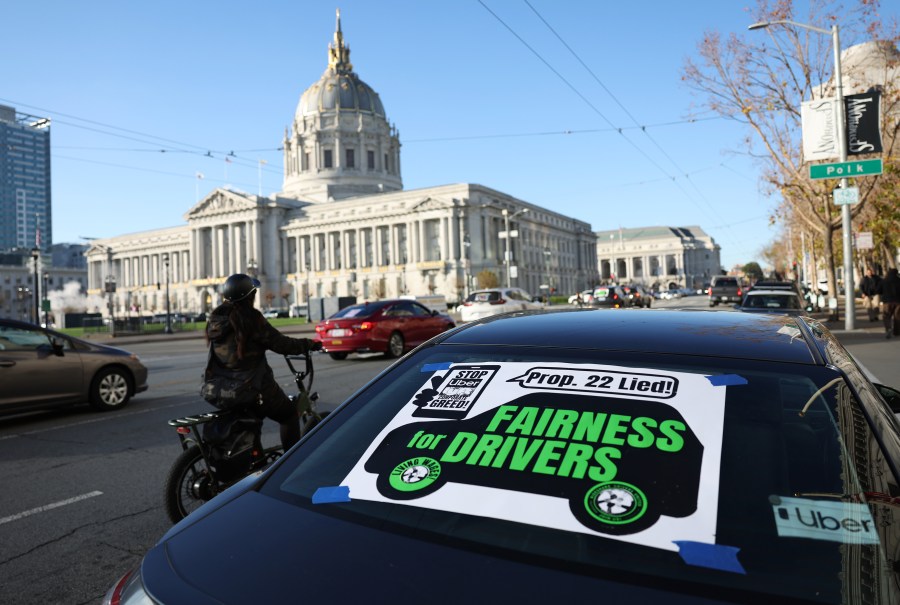No reward for loyalty: Gig companies winning fight to classify drivers as independent

Back in 2020, California voters approved a measure called Proposition 22 that allows Uber, Lyft and the like to classify their drivers as independent contractors, rather than employees. That means the companies can sidestep laws that would otherwise require them to deliver all sorts of job-related benefits. It’s been a bumpy legal ride, but so far Prop. 22 is prevailing in state courts.
The first thing to know about “Scott” from Los Angeles County is that he’s unaffiliated with either the Service Employees International Union — the union suing Uber and Lyft over Prop. 22 — or the industry-backed Protect App-Based Drivers & Services coalition. Scott didn’t even vote in 2020, when the measure was on the ballot.
“I was a little nonchalant about Prop. 22 because I was just getting started, and things were surprisingly good back then,” Scott said. He declined to share his last name because he fears Uber might retaliate against him for speaking publicly.
Scott said his opinion of Prop. 22 changed after it took effect. The measure required gig employers to pay 120% of minimum wage, and that became a kind of ceiling for Scott rather than a floor. In other words, Scott said he makes about $18.60 an hour now.
But he used to make more, a lot more. “In the past, I was making $30, $40, $50 an hour with Uber,” Scott said.
Yet Scott said he still loves choosing his own hours, 20 to 25 a week, and he’s not really bothered by the fact that independent contractors, as defined by Prop. 22, don’t have the same protections as employees do under California law.
Uber and Lyft cheered the recent appeals court ruling that upheld most of Prop. 22. The companies say drivers like Scott want flexibility and independence. And that most drivers are not relying on ride-hailing work for their livelihoods.
A report published last year by the University of California at Riverside’s Center for Economic Forecasting and Development, commissioned by the industry-backed drivers coalition, found that “only 23% of drivers report working with platforms on what would conventionally be considered a full-time basis.”
Uber CEO Dara Khosrowshahi said as much in a recent talk before the Economic Club of Chicago. “They can, you know, earn another $500 a week for groceries or whatever else they need to live.”
But labor lawyers say gig companies are exploiting drivers by refusing to provide the benefits employees would receive — and exploiting taxpayers by socializing the costs drivers can’t afford to cover on their own. Law professor Catherine Fisk of the University of California, Berkeley, wrote a friend of the court brief on behalf of a group of California labor and employment law professors.
“I don’t think it’s really in the public’s interest to have such a large group of workers who are carved out of the minimum protections of state law,” Fisk said.
In the meantime, Prop. 22 has inspired copycat measures in Washington state and Massachusetts, with varying degrees of success.
Related links: More insight from Meghan McCarty Carino
As I mentioned, things have gone back and forth on this issue quite a bit, and it’s kind of a long story.
Until 2019, gig workers were largely regarded as contractors — that was the year the California Legislature passed a bill that would make them employees.
But that’s also when the gig companies got together to push Prop. 22, that ballot measure to keep drivers independent contractors, and they spent about $200 million campaigning for it.
California voters approved the measure in 2020, but court challenges came next. While a state appeals court has upheld the law, the challenge could still go to the state Supreme Court.
And as Rachael Myrow mentioned, this isn’t just playing out in California. Washington state adopted a law that’s pretty similar to Prop. 22 last year, while a proposed ballot measure in Massachusetts was tossed out in court.
And at the federal level, the Joe Biden administration has proposed rules that could supersede state laws and set a higher bar for classifying workers as independent contractors.
The future of this podcast starts with you.
Every day, the “Marketplace Tech” team demystifies the digital economy with stories that explore more than just Big Tech. We’re committed to covering topics that matter to you and the world around us, diving deep into how technology intersects with climate change, inequity, and disinformation.
As part of a nonprofit newsroom, we’re counting on listeners like you to keep this public service paywall-free and available to all.
Support “Marketplace Tech” in any amount today and become a partner in our mission.


















